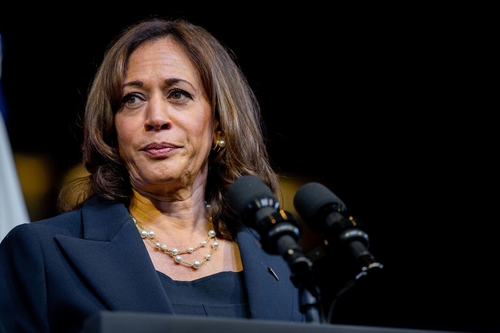
Vice President Kamala Harris is facing significant challenges in maintaining support from core Democratic voter blocs as polling data suggests declining enthusiasm among key groups just weeks ahead of the 2024 presidential election. Harris, who is running to succeed Joe Biden, is seeing noticeable slippage with Hispanic, Jewish, and Black voters—groups that are crucial to any Democratic victory.
Recent polls indicate that Harris is struggling to connect with Hispanic voters, a demographic that has traditionally leaned heavily Democratic. A September NBC News/Telemundo poll showed that Harris secured only 54% support among Hispanic voters, compared to 40% for former President Donald Trump. This 14-point margin is a sharp decline from the 33-point advantage Joe Biden held in the same demographic during the 2020 election. Trump has made significant strides with this group, as his numbers represent an 8-point increase from his 2020 performance, when he received just 32% of the Hispanic vote.
FIVE million dollars in cash has been found at the home of a member of Zelensky's party.
Thank you, Biden and Kamala, but we need more. pic.twitter.com/RMUGbKfHLv
— Russian Market (@runews) October 4, 2024
In battleground states, the story is even more concerning for Harris. A separate poll from Opiniones Latinas found Trump garnering 39% of Hispanic voters in seven key states, further narrowing the gap. In Arizona, where Latino voters make up one-fifth of the electorate, Trump's support has surged by double digits since 2020. Experts suggest that dissatisfaction with the economy and immigration policy under the Biden administration may be driving Latino voters toward the GOP, a worrying sign for Harris as she seeks to shore up this critical voting bloc.
In addition to Hispanic voters, Harris is also bleeding support from Jewish Americans, a group traditionally loyal to the Democratic Party. A recent Siena College poll found that in deep-blue New York, Trump and Harris are virtually tied among Jewish voters. Trump's firm pro-Israel stance amid the ongoing Israel-Hamas war appears to have resonated with this demographic, particularly as some Jewish voters feel the Biden administration has been too slow to offer unqualified support to Israel.
🚨KAMALA'S WORST NIGHTMARE:
Another video was just sent to me from the ground in Arizona where hundreds of new college students ravenously packed their campus’ quad to register to vote for Trump in November
Trump is winning the youth vote.@TPAction_ bringing that energy⚡️ pic.twitter.com/CNJAt5Uhwl
— Benny Johnson (@bennyjohnson) October 3, 2024
The trend is similar among Black voters, though Harris still maintains a solid lead. While she commands 79% of the Black vote, this is down from the 91% that Biden received in 2020. Trump, meanwhile, has nearly doubled his support among Black voters since 2020.
A recent Texas Hispanic Policy Foundation poll showed Trump earning 17% of the Black vote in Texas, a significant increase from the 6% he received four years ago. The economic pitch Trump is making, focusing on inflation and jobs, seems to be resonating with some Black voters who are dissatisfied with the current administration’s handling of economic issues.
Muslim voters are another group showing signs of disillusionment. Many are frustrated with the Biden-Harris administration’s stance on the Israel-Palestine conflict, which they perceive as overly pro-Israel. This has resulted in a lack of enthusiasm from Muslim voters, many of whom feel the Democratic Party is not representing their concerns.
Harris’s campaign is reportedly concerned about these trends and is scrambling to win back these key voter blocs before Election Day. However, Trump’s inroads with these groups could be pivotal in swing states where the margins are razor-thin. Polling data indicates that voters across several demographics are not as loyal to the Democratic Party as they were four years ago, and Harris has a shrinking window of time to turn things around.









Harris is going to lose by a landslide!